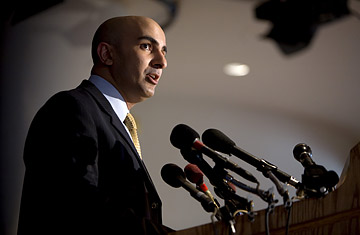
Neel Kashkari speaks about a plan to ease mortgage payments through mortgage finance giants Fannie Mae and Freddie Mac during a news conference in Washington November 11, 2008.
The effort to stem foreclosures and the depressed house prices they perpetuate entered a new phase on Tuesday as Fannie Mae and Freddie Mac announced a fast-track program meant to make hundreds of thousands of mortgages affordable to people who can't currently meet their monthly payments. The roll-out follows on the heels of new loan modification programs at JP Morgan Chase and Citigroup, but the move at Fannie and Freddie, which together hold or guarantee some 58% of single-family home loans, has the potential to reach much farther since the mortgage industry often takes its cue from the two entities.
It is the boldest attempt yet by the U.S. government, which placed Fannie and Freddie in conservatorship in September, to address the foreclosure crisis. At the same time, some consumer advocates, as well as the chairman of the FDIC, are already complaining that the plan doesn't go far enough. (Read "Four Steps to Ending the Foreclosure Crisis".)
Under the new program, homeowners with mortgages held by Fannie and Freddie who are at least 90 days delinquent will be eligible to have their monthly payment reduced to 38% of gross income, as long as they're not in bankruptcy and can illustrate a hardship or change in financial circumstances. This model, based heavily on a streamlined loan modification program the FDIC is implementing at the failed lender IndyMac, is a strong endorsement of the idea that doing a lengthy analysis of homeowners' finances is taking too long to make a dent in the nation's housing woes.
But the details of how, exactly, monthly payments will be lowered has raised concern in certain quarters. In a news conference explaining the program, James Lockhart, who runs the agency that oversees Fannie and Freddie, highlighted three tacks: reducing interest rates, extending the length of loans and, in some cases, deferring payment on part of the principal. There is a big difference, though, between permanently reducing an interest rate and doing it temporarily. And the new program doesn't forgive principal, only defers it, which may not go very far at a time when some 18% of mortgage holders owe more to the bank than their house is worth. "If all they're doing is lengthening the loan maturity, it may reduce the economic stress a little bit, but it doesn't deal with the main problem, which is you have an underwater loan," says Richard Green, director of the Lusk Center for Real Estate at the University of Southern California.
In a statement, FDIC chairman Sheila Bair, who has seen her own suggestion of the U.S. government directly guaranteeing mortgages sidelined, called the new program "a step in the right direction" but also took it to task for not more directly addressing mortgages held in private securities. As Lockhart pointed out, mortgages owned or guaranteed by Fannie and Freddie represent less than 20% of serious delinquencies. Private label securities — those packages of mortgages that were sliced and sold to investors — represent some 60% of serious delinquencies. Lockhart made an appeal for servicers of such securities to "adopt this program as the industry standard," but the extent to which that will happen is questionable, considering that servicers have an obligation to investors not to take unnecessary losses.
And then there is the question of moral hazard, a continual refrain in dealing with almost every aspect of the housing and broader financial crisis. In order to target the most at-risk borrowers, the new program only kicks in once homeowners have missed three mortgage payments. Even though the program intends to exclude people who stop making payments just to get a modification, there is a concern that homeowners will be incentivized to do so. "They're saying to everyone out there, don't make your mortgage payment, be 90 days late, and then we'll help you," says Bruce Marks, CEO of the Neighborhood Assistance Corporate of America, a non-profit that works with servicers to modify mortgages.
But that might simply be unavoidable. "I'm very sympathetic to the view of why should people who played by the rules and paid their bills on time be placed at a disadvantage, but that's a second-order thing to worry about," says the Lusk Center's Green. "Unfair stuff is going to happen. If it saves the financial system, everyone benefits."
